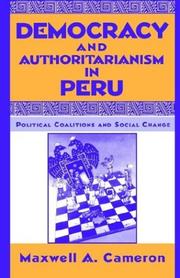Check nearby libraries
Buy this book

Under what conditions is democracy stable? What forces undermine or reinforce democratic institutions in Latin America? This book suggests answers to these questions in the context of Peru, one of Latin America's least stable democracies.
It identifies the micro and macro causes of Peru's gradual breakdown of democracy, beginning with its transition from authoritarian rule in 1980 and culminating with President Alberto Fujimori's 1992 autogolpe ("self-coup"), the suspension of the Constitution and closure of Congress.
Democracy and Authoritarianism in Peru stresses how recent changes in the class structure - particularly the informalization of the economy - have created social conditions unfavorable to stable political coalitions in Peru. Cameron also emphasizes the role played by political actors' responses to those changing structural conditions. The result is an analysis of the crisis of Peruvian democracy that not only weighs the importance of structural constraints, but also of political choices.
The book will be of broad interest to anyone concerned with problems of democratic consolidation.
Check nearby libraries
Buy this book

Previews available in: English
| Edition | Availability |
|---|---|
|
1
Democracy and authoritarianism in Peru: political coalitions and social change
1994, St. Martin's Press
in English
0312121539 9780312121532
|
aaaa
|
Book Details
Edition Notes
Includes bibliographical references (p. [209]-227) and index.
Classifications
The Physical Object
Edition Identifiers
Work Identifiers
Community Reviews (0)
History
- Created April 1, 2008
- 9 revisions
Wikipedia citation
×CloseCopy and paste this code into your Wikipedia page. Need help?
| July 14, 2024 | Edited by MARC Bot | import existing book |
| October 4, 2021 | Edited by ImportBot | import existing book |
| November 18, 2020 | Edited by MARC Bot | import existing book |
| April 5, 2014 | Edited by ImportBot | Added IA ID. |
| April 1, 2008 | Created by an anonymous user | Imported from Scriblio MARC record |









